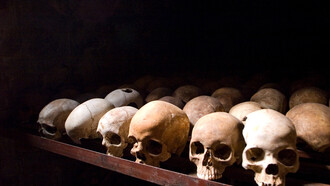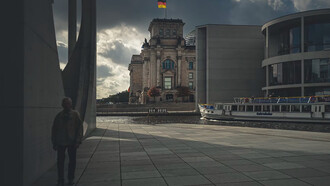Will alter globalism be able to renew itself in the face of neoliberal globalisation which is emerging from the crisis revealed by the pandemic? The strength of women is more than ever essential.
The World Social Forum is a place for open meetings aimed at deepening the reflection, the debate of democratic ideas, the formulation of proposals [...] of organisations and movements of civil society that oppose neoliberalism and the domination of the world by capital and all forms of imperialism, and that work to build a planetary society centred on the human being.
(Porto Alegre Charter of Principles, Article 1).
In its new hybrid formula, the -World Social Forum will take place this year in Mexico City, from May 1 to 7, 2022, and is already taking shape through the preparatory meetings underway, as a challenge to the crisis unveiled by two years of the Covid 19 pandemic worldwide, killing more people than ever before, exposing the world's strongest economies, with a meteoric growth in poverty and precariousness, pushing the middle classes below the poverty line and reducing already disadvantaged and marginalized populations to a state of famine. A dramatic situation in the 21st century, but one that reminds us that a lot of countries have never stopped experiencing famine, unemployment and pandemics one after another, and that the media have forgotten despite the commitment of some organisations.
Based on the principle that no one should suffer from hunger, that everyone's fundamental right to adequate and healthy food should be respected, food, water and land should not be commodities on the market of economic speculation. The first element of the legitimacy of democracy is to break down structural racism through the establishment of equal salary, regardless of gender, religion or race, to promote public policies that reduce and prohibit inequality of opportunity by allowing the same opportunities for men and women, and to reduce the rate of unemployment, and consequently to reduce the food insecurity of children, adolescents and the elderly.
Thus, it is for life and against hunger that the World Social Forum 2022 denounces that hunger is a political project and the result of the evils generated by a social system of exclusion that violates the fundamental right to food. Hunger has a colour, a gender, a race and a place. It affects mainly street people, urban and rural communities, indigenous peoples, artisanal fishers, travellers, communities of African descent, populations threatened by extractivism.
The World Social Forum 2022, therefore, also challenges progressive forces to include, in a democratic way, all sectors of society widening participation to people in situations of socio-economic vulnerability, and to resume, with ethics and dialogue, public debates, in the fight against fake news and the challenge of an articulated social communication network of extremist media that have extended their tentacles on social networks during this pandemic, and that spread all the misinformation that this fascist extreme right produces.
Latin America, the birthplace of popular uprisings: WSF could not have been born elsewhere
The collective imaginary of a certain generation probably remembers Paulo Freire and his book Pedagogy of the Oppressed, Premise of Popular Education, or the Liberation theology of the Peruvian priest Gustavo Gutiérrez, the Marxist theory of dependence by the Brazilians Ruy Mauro Marini and Theotonio dos Santos and the formulation of the Theory of marginality by Aníbal Quijano, José Nun and Miguel Murmis. At that time, Latin American thought had acquired its own personality and profile, a social movement, a maturity and modalities different from those of Europe.
Indeed, around 1968, Latin America experienced drama and bloody confrontations, from the massacre of students in the Plaza de las Tres Culturas in Mexico City to put an end to the massive demonstrations against the regime, to the workers' uprising of El Cordobazo in Argentina, which forced the military regime of Ongania to initiate its retreat, the movement of the peasantry in Colombia to defend their land, break away from the tutelage of the reformist government of Lleras and break with the large landowners, and the student movement in Uruguay, which recorded 56 strikes, 220 demonstrations and 433 attacks.
It was in this gestation in the midst of profound changes that the social revolts and struggles were born, leading to important political repercussions in the region, and the emerging of new movements made up of activists much more politicised and active than their predecessors in the social field, These included the Julián Apaza Movement in Bolivia, the Federation of Cooperatives for Self-Help Housing (FUCVAM) in Uruguay, the Cauca Regional Indian Council in Colombia and the Ecuarunari in Ecuador, and, years later, the Mothers of the Plaza de Mayo in Argentina and the Landless Rural Workers' Movement in Brazil.
And it is in reaction to this social and economic upheaval of the working classes that the World Economic Forum has met every year since 1987 in Davos, Switzerland, initially started in 1971 as the European Management Symposium. Initiated by the controversial Klaus Schwab with contested aims, to influence global agendas and decision-makers, and to promote public-private cooperation, it is a place for analysis and discussion, but also a social spectacle, a gateway through which the wealthiest parade. It brings nothing new to the world's burning economic and financial problems and, since the collapse of communism and the triumph of the economic model represented by the USA, it is the quintessence of globalisation and the precariousness of the world's social classes and economic fabric, appearing today as the face of global governance, biosecurity, the "new normal", the "New Green Deal" and the "fourth industrial revolution".
Thus, around 1999, a new impetus emerged for the mobilisation of new social movements, which from the outset presented themselves as proposing alternative solutions to globalisation.
A first initiative was held in January 2001, in Porto Alegre (Brazil), on the same dates as the Davos Economic Forum: the first World Social Forum (WSF), whose slogan is: "Another world is possible", was born, bringing together associations, NGOs, political and trade union organisations that defend the primacy of human development over financial interests and demand democratic control of international economic decisions. The interest aroused by the WSF has made it, since its second edition, the expression of a real counter-power, governed since 2003 by the Charter of Principles, whose most important axes are opposed to the "neoliberal" order and open to all ideological currents for alternative projects, and the absence of political parties as such.
Since then, the WSF has come a long way, taking on its own rhythm and pace for more than 20 years through global, regional, national and thematic sessions, involving major international networks as well as thousands of grassroots organisations. Governed by a representative International Council of about 150 international organisations and networks, it is constantly being challenged and debated, in order to maintain its role as an open place for evolving dialogue towards an active role of coordinated impact for the alternative to capitalism and imperialism.
In the meantime, popular uprisings have never stopped, the peoples of the world have been inspired by the popular insurrections in Latin America. Our eyes are now directed towards this part of the globe which inspires us to resist, to continue to live and not just survive. Since then, rulers can no longer be able to dictate their laws without taking into account civil society and the popular movements that created it. Nothing is the same as before. The formerly subjugated peoples have gradually and one by one risen from their plight and continue their struggles. And even though the world, for better or worse, is more chaotic, it is still in motion because change has become the norm.
Then, through the popular revolts in Africa from 2011 onwards, and the different World Social Forums organised, in Tunis in 2013 and 2015, the Social Forum of Resistances was born, in 2017, in Porto Alegre, with the objective of creating a place for the articulation, dissemination and expansion of all the forms of resistance created by the cultural, environmental, political and social movements in Brazil and Latin America. Indeed, in recent years, Latin American peoples have once again gone on the offensive in a wave of unprecedented uprisings, which has crossed the continent in 2019, in a dynamic in which women, indigenous people and Afro-descendants have played an important role and have had to face the Covid 19 pandemic, inviting us to review the concepts with which we understand collective action.
On the other hand, it is with great satisfaction that we note the rise of feminism, indigenous organisations and urban, precarious youth, leading to a reconfiguration of social protest, which has been powerfully expressed through the popular uprisings of 2018-2020, notably in Haiti, Colombia, Ecuador and Chile. Opportunities to organise social forums have multiplied, particularly as alternative places to institutional summits, such as the Popular Social Forum of Resistance to Habitat III in Quito in 2016. Last but not least, mobilisation against the climate crisis, particularly among young people, has grown, organising counter-summits at COP25 and COP26.
This social movement carries with it the demand for different politics, and for doing politics differently. Meanwhile, the left won the elections in Honduras with Xiomara Castro, the first woman president, and in Chile with Gabriel Boric, the left came back to government after the Pinochet dictatorship and the failures of the neoliberals. The next challenges will be the elections in Brazil, pitting Lula against Bolsonaro, and in Colombia, where the political landscape is becoming clearer.
Is the utopia of "another world is possible" so utopian?
Since the beginning, the debate has been going well, from one commission to another and from forum to forum, this question is now at the heart of all the struggle and the commitment we have embraced. We, the alter globalists, are convinced that it is necessary to start by changing the economic and political organisation, to propose non-totalitarian alternatives to liberal capitalism, an "alter-economy", an "alter-democracy", and an "alter-ecology". In the face of a global democratic crisis that has made the nation-state vulnerable, and a growing deployment of authoritarian and despotic governments around the world, it is urgent to question why and how, despite the existence of genuine alternatives already put into practice in resistance to these autocracies, so-called "democratic and progressive" countries find themselves ruled by political mercenaries who promote hunger, inequality, environmental degradation, and disrespect for democracy and human rights.
And despite a liberalism that is disseminating its doctrine of infinite growth, this vast global movement, alter globalist, horizontal and democratic, organised around humanist values, in an extraordinary political articulation, since the year 2000, it has been organising and mobilising thousands, even tens to hundreds of thousands of people throughout the world on all issues, and in particular on the environmental crisis which has been generating major disasters on all continents for decades, with extreme temperatures causing drought, floods, hurricanes, from South America to the North, to Europe, Asia and Africa. A major and dramatic crisis, accompanied by the domination of technology in all sectors, which has wiped millions of jobs, expelling and excluding billions of people from the world of work, and turning the world into a dramatic spectacle of unemployment, homelessness, an accumulation of shanty towns and an unprecedented precariousness of the human condition, pushing desperate young people to throw themselves into the sea to cross rather than continue living.
Twenty-one years on, what is the assessment of the WSF?
The WSF is now an ongoing process. Its hybrid formula has enabled to multiply dialogue and debate: with dozens of online debate/coordination groups, hundreds of webinars, otherwise impossible assemblies, such as the 6 sessions of the Virtual World Assembly of Inhabitants, organised by the International Alliance of Inhabitants, which brought together over 1.100 activists from 77 countries in the last 24 months, and the Connect Forum, which is mobilising hundreds of organisations in all continents, especially in Africa and Asia, which have so far been left on the sidelines of the Forums, have been able to converge towards the WSF in Mexico and will continue to do so.
Since 2001, the main existing permanent structure has been the International Council, created in the aftermath of the first World Social Forum by the Brazilian organising committee so that the Porto Alegre event would become an international process anchored in the global social movement. Since its creation, La Via Campesina, the International Alliance of Inhabitants, Attac, the Landless Movement, ABONG (Brazilian Association of Non-Governmental Organizations), CIVES (Brazilian Association of Businessmen for Citizenship), CBJP (Brazilian Commission for Justice and Peace), IBASE (Brazilian Institute of Socio-Economic Analysis), CUT (United Workers' Central), among others, have been part of the International Council, while dozens of other organizations and networks have joined since.
In 2005, at the end of a consensus-based decision-making process on the Forum's themes, which often took the form of an accumulation of speeches from different groups and led to behind-the-scenes decision-making by the most influential, the International Council, finally gave up in favour of a self-organised and participatory process of constituting the programme and its many articulations.
To be clear, the organisation of the Forum event is not an end in itself (as if only the content of the debates were important), but a process embodying an alternative society: "The World Social Forum is a process that stimulates the organisations and movements that participate in it to situate, at the local or national level, their actions [...] introducing into the world agenda the transformative practices that they are experimenting with in the construction of a new world" (Article 14, Charter of the Porto Alegre Principles).
But the WSF as a place for debate, without action, was not always so. In 2002, the European Social Forum called for a mass protest against the impending US invasion of Iraq, and in 2003 the Forum played a key role in organising the Day of Action against the same invasion, in which 15 million people demonstrated in the streets of 800 cities on all continents, the largest demonstration in history at the time.
The struggle against neoliberal globalisation and for the construction of a better world has evolved greatly over the last 21 years through the Forums organised in Florence, Paris, Mumbay, Quito, London, Porto Alegre, Bamako, Caracas, Athens, Malmö, Dakar, Tunis, etc. Organisations and activists from the nebula of alterglobalism are now on about equal footing in the Forum, regardless of their ideological positioning, political agendas, organisational methods and financial resources, both in participation and in the media.
The second Social Forum of Resistances 2022, ended last week whose main and initiating axis was "Fora Bolsonaro" "Out with Bolsonaro!", was articulated in 13 Convergence Meetings from January 26 to 30, 2022, on diverse and varied topics, in a hybrid form, in Porto Alegre and online, involving the majority of social sectors. The proposals of each Convergence Assembly were presented at the Assembly of Assemblies, during which the points of consensus, the collective priorities and the construction of a Common Agenda of Struggles for the next period were identified.
With the participation of several countries, including Brazil, Venezuela, Canada, Cuba, Chile, Mexico, Tunisia, Italy and Morocco, the proposals elaborated at the Resistencias 2022 SF will be presented at the WSF 2022, which will be held from 1 to 7 May in Mexico City and online.
The future of the WSF: impactful decisions, women as protagonists
Within this evolving framework, a group of long-standing members of the International Council created a Renewal Group to call for a shift from a "meeting place" to a "place of gathering and action" by proposing reforms such as: decisions with a very high quorum, no longer by consensus to avoid stalemates, renewal of the International Council to make it more representative and capable of taking decisions, including for mobilisations, in short almost a new International. However, other historical founders object that the introduction of majority decisions would lead to divisions, which would bring the Council closer to the method of political parties, which have shown their great limits.
One of the main challenges of this WSF will be to attract the new social movements that play a key role in the struggle against the capitalist model, especially the youth movements mobilised in the fight against climate change as well as the mobilisation of organisations from Africa, Asia and the Middle East, and the challenge of reconnecting with the social movements that have distanced themselves in recent years from the WSF (La Via Campesina, World March of Women and others).
To achieve this goal, in addition to the mobilisation in Mexico, a veritable army of activists is at work on all continents, made up of specialists in various themes and topics, people and organisations working in the field, supported by an essential collective of volunteer interpreters. It is a huge effort implemented by intelligent and solidarity ants to bring the galaxy of the alter globalization movement together towards decisions that will give new impetus and impact to the slogan Another World is Possible.
In this perspective, the Mexican Organizing Committee of the WSF 2022, which brings together more than 120 social organizations, in conjunction with the International Council, agreed on November 27th 2021 on the importance of re-launching the alter globalization movement to face the new challenges created by the rise of the right wing, the climate crisis and the crisis revealed by the global pandemic,, Meanwhile, an agreement has been reached with the Mexican government to hold the WSF in the city centre, more precisely in the Zócalo, the central square in front of the presidential palace, a historical and symbolic place, site of the ancient capital of the Aztec empire that the Spanish conquerors destroyed in their genocidal operation.
Whatever decisions are made, the year 2022 will be the most significant year in human history for the emergence of women's struggles and empowerment around the world. Their voices have never been nor will they remain silent.















